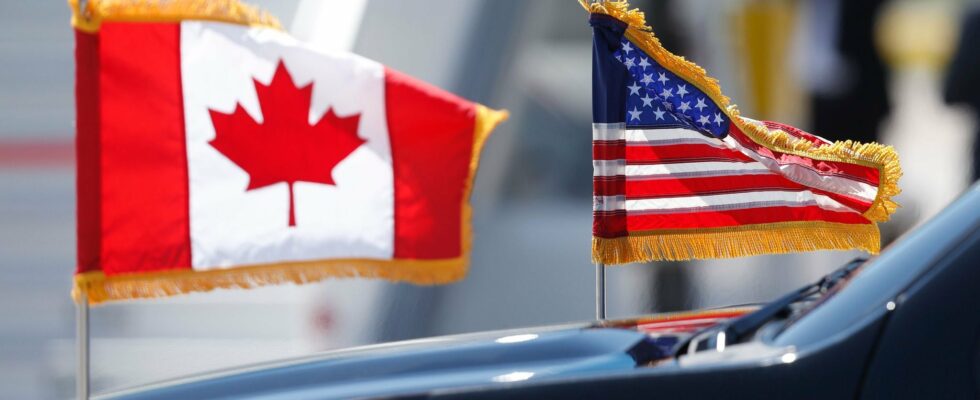In love, as in international business, partners sometimes choose to renew their vows. Canada, Mexico and the United States are preparing for 2026. Representatives of the three states will have to meet to confirm that they wish to continue their participation in the CUSMA free trade agreement, the one which replaced the NAFTA in 2020. At the initiative of Donald Trump, the new treaty provides for a meeting every six years for a review.
On the Canadian side, the departure of Prime Minister Justin Trudeau is disrupting the political landscape. Hypotheses are open as to the identity of the one who will take a seat at the discussion table facing the American president, determined to dictate his conditions. “The recent resignation of Prime Minister Trudeau and a probable change of government during the next elections could be perceived by Donald Trump as a form of weakness, which would encourage him to force Canada’s hand even more,” considers Tony Stillo, director of Canadian Economic Analysis at Oxford Economics.
During his first term, Donald Trump called NAFTA “the worst trade treaty ever signed.” At the end of negotiations punctuated by threats and ultimatums, he then extracted some concessions from Justin Trudeau. This time, the president-elect seems to want to redouble his zeal. In a few weeks, he has multiplied hostile remarks against the two other signatory states, such as this intention to make Canada the “51st American state”. Without forgetting his favorite weapon – the threat of customs duties, up to 25%, on imports from Canada and Mexico.
If implemented, these tariffs will plunge the Canadian economy into recession in 2025, according to calculations from Oxford Economics. A response from Ottawa cannot therefore be ruled out. “The strategy of turning the other cheek, as Justin Trudeau did in 2018, will no longer be able to work in current conditions, assures Geneviève Tellier, professor of public finance at the University of Ottawa. From now on, Canada will have to take a hard line, imposing customs duties in retaliation.”
Prepare the ground
Behind the scenes, negotiations have already been progressing for a while. Former Finance Minister Chrystia Freeland, who resigned shortly before Justin Trudeau, had anticipated the 2026 deadline: from September 2023, she had summoned some big bosses and unions to refine her negotiation strategy, reports the Quebec daily The Press.
But Donald Trump’s choice to increase the pressure in recent weeks precipitates the need to specify a strategy, despite the political vagueness. “Canada is not going to sit idly by waiting for the next government. It will have to react to Trump’s threats by trying to minimize losses,” imagines Patrick Leblond, professor of public and international affairs at the University of Ottawa. This waiting time will also be a time of lobbying to explain to American businesses and politicians that the trade war will hurt both sides.” For his part, Tony Stillo plans for the Liberal government to consult the Conservative Party to coordinate a negotiation strategy.
For the moment favorite for the next election, the leader of the Conservatives Pierre Poilievre has not yet revealed his roadmap for negotiating with Donald Trump. Especially since the American president’s speech has evolved compared to 2018. “Trump is now pursuing non-commercial objectives, such as border control, drug trafficking and Canada’s defense spending, in addition to objectives related to to trade. And it puts economic pressure on Canada to obtain them,” explains Tony Stillo.
Several negotiation levers
The two North American neighbors have some differences, which could be used as leverage in the debates. A dispute over lumber has dragged on since the 1980s, with Canada regularly accused of “dumping”. Energy is also a sensitive point: the province of Alberta supplies oil to the United States while Quebec exports electricity. The automobile – another subject mentioned by Donald Trump – fuels the concerns of manufacturers, whose production chains are closely connected between the two countries.
But it is dairy products that could serve as major negotiating leverage. In particular, the “supply management” system, controlling production and pricing, could be called into question, which would penalize the Canadian sector. “A conservative government could make concessions on this subject, since its electoral base is in the West while dairy producers are more in the East,” explains Patrick Leblond.
What if the agreement continued without Mexico? The idea was raised in November by Ontario Premier Doug Ford, who criticized Mexico for bringing Chinese products into American territory. “Everyone knows that three-way exchange is more profitable than two-way. But if we have to save the furniture, separating from Mexico could be considered the right thing to do,” concludes Geveniève Tellier.
.
